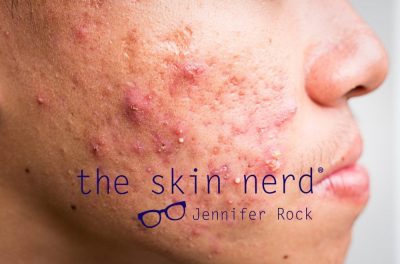
Cysta, Cysta: Cystic Acne Vs. Other Grades of Acne
Controversial opinion: cystic acne may be one of the most incorrectly self-diagnosed skin conditions in the world for a number of reasons. This may be the one of the reasons that it ends up being a nightmare if you’re not under guidance, whether it be the guidance of a GP or a dermatologist. Cystic acne is what many think of when they hear the word “acne” where, really, it is the most severe of the acne subtypes, making it all the more rare.
Blackheads are technically acne, even though those with blackheads would not consider themselves acneic. Cysts aren’t even just those real big spots because a large spot could be a large papule, which is a sore, inflamed whitehead, or a nodule, which is like a cyst but without the pus.
Now, I don’t encourage self-identification of your acne subtype. It must be left to medical professionals who will truly know the nuances and can thus recommend how to treat it best. Nevertheless, for nerdie informative purposes…
Identifying Cystic Acne
Them babies are deep
An acne cyst will be under the surface. You know the type. However, where other types of spot come to the surface and grow a head if left alone, cystic acne usually will not.
Acne cysts have a smooth surface which is sometimes like a dome
Your papules and pustules can be a little bit conical in shape. Cysts will have a smooth surface as if the skin is being stretched… because it is, to be fair. You may notice if you have a big cyst that it will appear a little bit shinier and may catch the light (why, God?!) and this is due to the tautness of the skin on the cyst.
They hurt
Not only is cystic acne an eyesore for the beholder but it is also physically sore. It is not like the mild stinginess you get with a whitehead sometimes. With cystic acne, the pain can be a dull, day-long throb and accidentally hitting cysts off something may send a shooting pain through your face.
Acne cysts on a woman's chin
Dealing With Cystic Acne
If you think you have cystic acne, I believe your first port of call should be your GP. They will decide whether you should be on oral and/or topical antibiotics, a hormonal treatment or the grande dame, RoAccutane. In the skindustry, we can aid and assist using cosmeceutical and cosmetic skincare alongside medical treatments to help minimise the appearance of cystic acne. Even when it comes to our online consultations, we will recommend that the client goes to a GP if they present with cystic acne and haven’t been to their GP about it of yet. When it comes to bringing cystic acne down, the Americans nip to their dermatologist for a quick cortisone injection. There is more of a dermatology culture in America which is a great thing but it is simply not feasible for most in Ireland (and the rest of Europe) to pop to their dermatologist any time they get a spot.
What can help cystic acne?
Ice, ice, baby
Holding an ice cube against an acne cyst can help to ease the pain of it and may bring down some inflammation and redness. Wrap the ice in a gentle cloth, some kitchen roll or a Cleanse Off Mitt!
Skip treatments made to dry it out
Your usual cosmetic spot treatments can’t penetrate deep enough to do a whole lot to an acne cyst, hence the popularity of cortisone injections. You need something that has a small enough molecule to get deep into the skin and something that won’t just cause major flaking on the top layers of the acne cyst. Something truly potent is your best shot, like the IMAGE Clear Cell Clarifying Cleanser (€36.00).
Do not pick – I REALLY MEAN IT THIS TIME
If what you have is truly an acne cyst, you will not be able to get anything out of it. If you attempt to pop it, you will only aggravate it and cause the infection to spread inside the skin. Cystic acne is the subtype of acne most likely to cause scarring and post-inflammatory hyperpigmentation too. Don’t poke the bear.
Soothe the angry beast
People often think that when they have a cyst, they should skip hydrating to dry it out. Really, you should be doing the opposite. Hydrated skin = healthy skin. Use a serum that soothes your skin, something that contains ingredients that bring down inflammation whilst bringing up hydration levels.

I know I mention it a lot but the IMAGE Ormedic Balancing Antioxidant Serum (€67.00) contains moisture-retaining sodium hyaluronate and aloe leaf extract which is a known calmer and healer. Another option for a soothing serum would be the Yon-ka Hydra N˚1 Serum (€64.00). It contains aloe vera and vegetable glycerine to repair and moisturise the skin, as well as squalane and essential oils.
Protect against scarring
A healthy skin is a skin that will heal better. Vitamin A supplements help skin health from the inside out and I see them as essential. Be aware that RoAccutane is vitamin A so they cannot be taken with RoAccutane. Add some growth factors to your skincare routine. Growth factors are why we recommend Environ’s Colostrum Gel (€46.00) to those with acne and scarring – we do not suggest popping pre-milk substance on yourself for no reason. Growth factors, through a chain of responses, promote cellular tissue health and repair and help to boost the production of collagen and elastin.
Basically, this means that growth factors can help to prevent and undo shallow textural scarring to an extent. Cystic acne goes hand in hand with post-inflammatory hyperpigmentation… The more inflammatory, the more hyperpigmented. SPF is especially key for this reason.
A lightening serum that inhibits tyrosinase, the enzyme that creates pigment, could be the difference between a dark, dark pigment spot and a much lighter one. I adore IMAGE Skincare’s Iluma Intense Brightening Serum (€52.00) as it contains a patented ingredient known as Tyrostat which is a potent tyrosinase inhibitor and comparable to the now illegal hydroquinone.
Reduce stress
Stress is linked to nearly every skin concern and condition under the sun and many who suffer from cystic acne note that they will have a new crop of cysts in times of stress. It sounds like ludicrous advice but try yoga, meditation, mindfulness and radical acceptance and you may actually truly see a difference. I repeat this advice as it is something that many neglect and it is definitely something to be conscious of.
Treat Cystic Acne ASAP
I get quite emotional when it comes to the topic of cystic acne. Cystic acne is most prevalent in those in their teen years and because of this, it is written off as a teenage thing. Teenagers come to parents and say they are worried about their skin and their parents may nip out and grab them a cleanser from the supermarket and send them on their way. Cystic acne is a debilitating skincare condition, as are the other subtypes of acne, and can cripple someone’s confidence.
I have met people who are still self-conscious about their skin even though they haven’t had acne in years as the mental effects have stuck with them. Ignoring acne and not going to a GP about it leads to it getting worse and can leave people with scarring and marking for years. Skin therapists can treat grade 1 and grade 2 acne, meaning open comedones, blackheads, closed comedones and papules (AKA the teeny bumps) and pustules (AKA the gooey-er whiteheads).
When it comes to grade 3 and grade 4, more severe forms of acne, we must refer clients to a GP. Without medical control, the infection can go deeper and start to cause long-term damage to the structure of the pore. This is not what anyone wants. If you feel that you may have cystic acne, my general advice is to speak to your GP. You can use cosmeceutical and cosmetic skincare in addition to the advice of a medical professional and with the guidance of them– we have clients who are on regimes with us and are reverting to their GP or dermatologist to ensure they are okay to use them.
Cosmeceutical and cosmetic skincare is ideal for maintenance after a course of treatment for cystic acne and to help with clearing up the pigmentation left behind!
If you’re interested in having a bespoke skincare regime created to help you maintain the results of acne medication, join the Nerd Network now

